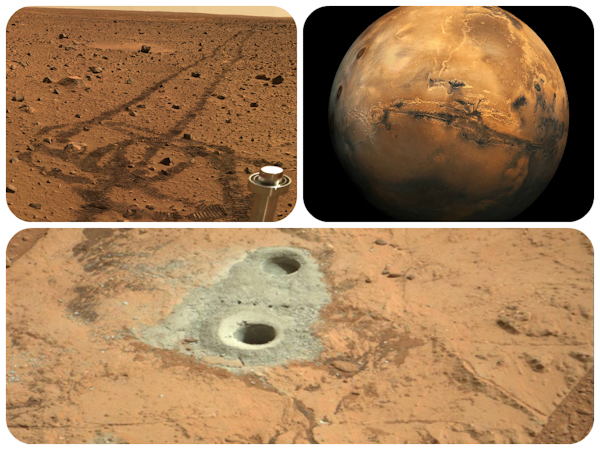Photo by: Henoc Kivuye
The Curiosity rover discovered trace amounts of liquid water in Mars’ soil content. Scientists theorize that the actual percentage of water is around 2 percent by weight. However Dave Compton, an adjunct faculty for science and engineering, said that there was not much water to be discovered.
“Most of [the water] is in very small, trace amounts that is in the soil,” Compton said. “It’s not like a flowing stream or lake or anything. It’s either ice crystals or smaller water molecules that are mixed in with the dirt, so basically the dirt is just a little bit moist.”
There are varying opinions on the many possible sources of the small percentage of water found.
“[This discovery] is not too surprising to me because looking at what the Solar System is made of, you have lots of comets,” Compton said. “Comets tend to bump into things, so it’s possible that a comet could have bumped into Mars. A comet is mostly ice, so it would only take a few comets to hit the surface to give it water.”
Chair of the Department of Mathematical Computer and Information Don Leftwich said he felt that water might actually be under the surface of Mars.
“I absolutely think that [an underground water source] is a possibility and that it would be really exciting for scientists to discover pools of water that still exist under the surface or elsewhere,” Leftwich said.
Compton affirms this idea with a twist.
“[The scientists and robots] haven’t been able to drill super deep, so there might be more dense ice under the soil,” Compton said.
Senior Lisa Robinson offered her opinion on the recent discovery of water on Mars.
“I think [this discovery] implies that, given the right environment, you could probably grow vegetation on the planet,” Robinson said.
The implication that scientists would be able to grow plants on the Martian planet raises a question that has been asked for ages.
“Forever, human beings have wondered if life might exist off of our own planet,” Leftwich said. “Life is incredibly abundant here [on Earth]. We find life in places that we weren’t expecting life to exist, but we’ve never observed life anywhere else on any other moon or planet.”
Leftwich also commented on the possibility of alien life on Mars.
“[This discovery] is important because anywhere that we know of that life exists, it’s always in the presence of water,” Leftwich said. “If life were to exist on Mars, we would also expect that to be true there.”
However, Compton negates the idea of life on Mars solely because water was found in the soil.
“It’s not like there is nowhere else in the Solar System that water has been seen,” Compton said. “Water exists all throughout the universe.”
Robinson said that while alien life might be a stretch, future human life could be a possibility.
“I’m intrigued,” Robinson said. “It’s a little strange knowing that you can potentially grow things on other planets and that there could be people living there as well.”
Compton provided insight on the theoretical process of human colonization on the red planet.
“One of the reasons we send robots [to Mars] first is to see if it would be possible to send humans after, and by these rovers finding pretty consistently that there’s water in the soil, that means that we could send astronauts there who could then take that soil and process it and get the water out and maybe have enough to live on,” Compton said.
However, with a discovery such as this, no one knows how human governments and people will react to the possible plans for the future. Compton said he felt that humanity will be divided.
“People, being people, will always be divided,” Compton said. “I bet you could find differing opinions even in NASA about what to do next, and everyone wants to be right. I think that the natural state of humanity right now would be division.”
Robinson agrees.
“I think [this discovery] will tear us apart more than anything,” Robinson said. “I guess I’m more concerned because I’m afraid that we’re going to try to plan to put some kind of colony on Mars, and I’m kind of afraid that they are going to try it and it’s just going to fail miserably.”
Even though the plans for what scientists will decide on in the future are unknown, Compton said maybe a trial period of exploration would prove to be best.
“In the short term I think we should send people there, have them be there successfully for a few weeks or a few months until the planets go realigned so that they could come back, and then come back,” Compton said. “As far as having a colony with children like the American Wild West frontier on Mars, it would be extremely difficult. We’re talking a hundred years from now.”












Be First to Comment